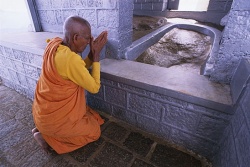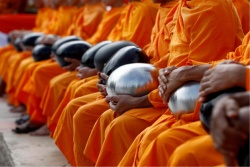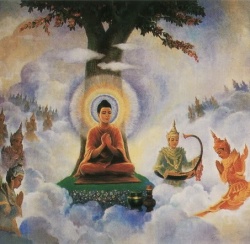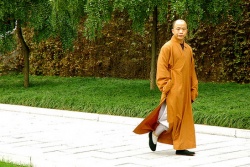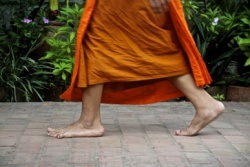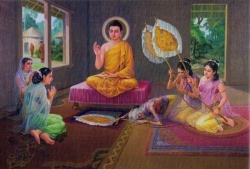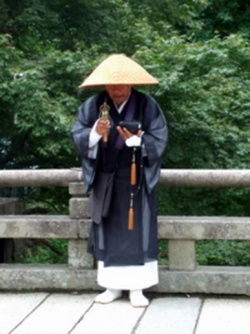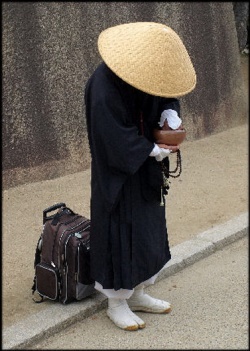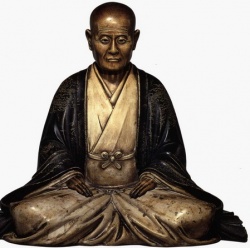Difference between revisions of "Sariputta and Moggallana"
m (Text replacement - "chief disciples" to "chief disciples") |
m (Text replacement - "non" to "non") |
||
| Line 25: | Line 25: | ||
It is also because [[Arahants]] have not eradicated [[samsaric]] [[virtues]] ([[vasana]] gune). It is only the [[Buddha]] who has eradicated [[vasana]] gune. [[Sariputta]] must have been a stimulating companion for he was sought after by many. What attracted [[people]] to him was his deep caring for others, his enormous [[patience]] and his exemplary {{Wiki|behavior}}. When [[Sariputta]] entered the [[meditative]] stage on the [[void]], even the [[Devas]] came t o pay homage to him. The following is [[Maha]] Kassapa’s praise of the elder: a "These many [[Devas]], powerful and glorious, Ten thousand ([[Devas]]), from Brahma’s company, Stand with joined hands worshipping him, [[Sariputta]] , [[wise]] marshal of the [[Dhamma]], The great medi tator in [[concentration]]. "Homage to you, O thoroughbred man, Homage to you, O supreme man..." -- ([[Theragatha]] 1082 - 1084) Despite the fact that he had a large following and was well - respected, [[Sariputta]] had difficulties convincing his mother, Rupasari, of th e [[Truth]], as she had been taught from [[birth]] the [[doctrine]] of the [[Brahmins]]. [[Sariputta]] had three brothers, [[Cunda]], Upasena and [[Revata]], and three sisters, Cala, Upacala and Sisupacala. All six took [[ordination]] under the [[Buddha]] and attained [[Arahantship]]. | It is also because [[Arahants]] have not eradicated [[samsaric]] [[virtues]] ([[vasana]] gune). It is only the [[Buddha]] who has eradicated [[vasana]] gune. [[Sariputta]] must have been a stimulating companion for he was sought after by many. What attracted [[people]] to him was his deep caring for others, his enormous [[patience]] and his exemplary {{Wiki|behavior}}. When [[Sariputta]] entered the [[meditative]] stage on the [[void]], even the [[Devas]] came t o pay homage to him. The following is [[Maha]] Kassapa’s praise of the elder: a "These many [[Devas]], powerful and glorious, Ten thousand ([[Devas]]), from Brahma’s company, Stand with joined hands worshipping him, [[Sariputta]] , [[wise]] marshal of the [[Dhamma]], The great medi tator in [[concentration]]. "Homage to you, O thoroughbred man, Homage to you, O supreme man..." -- ([[Theragatha]] 1082 - 1084) Despite the fact that he had a large following and was well - respected, [[Sariputta]] had difficulties convincing his mother, Rupasari, of th e [[Truth]], as she had been taught from [[birth]] the [[doctrine]] of the [[Brahmins]]. [[Sariputta]] had three brothers, [[Cunda]], Upasena and [[Revata]], and three sisters, Cala, Upacala and Sisupacala. All six took [[ordination]] under the [[Buddha]] and attained [[Arahantship]]. | ||
| − | [[Cunda]] was in later years [[Sariputta]] ’s attendant. Despite the fact that Rupasari had such distinguished children in the [[Order]], she herself was a | + | [[Cunda]] was in later years [[Sariputta]] ’s attendant. Despite the fact that Rupasari had such distinguished children in the [[Order]], she herself was a non - believer, deeply set in [[Brahmin]] [[rites]] and [[rituals]]. In fact, she had not wanted her youngest son, [[Revata]], to be [[ordained]] , and had planned a [[marriage]] for him at a very young age to prevent him from entering the [[order]]. However, on his [[wedding]] day, when [[Revata]] viewed the very old grandmother of his bride - to - be, he became disillusioned and, [[realizing]] the [[impermanence]] of all thi ngs, ran away from the [[wedding]] to the [[monastery]] to be [[ordained]]. His three sisters married, but gave up the household [[life]] and became [[nuns]]. Their children too entered the [[order]]. None of her children or grandchildren, however, could [[influence]] Rupasari. When [[Sariputta]] visited the city of his [[birth]] with a large gathering of [[monks]], he came to his mother’s house for [[alms]]. His mother, whilst [[offering]] them [[food]], insulted him in front of all the [[monks]] by berating him. She said, "O you, eater of others’ leavings. |
Wh en you fail to get [[food]] you go from house to house among strangers, licking the leavings from the back of their ladles. And so it was for this that you gave up eighty crores of [[wealth]]. You have ruined me. Now go on and eat." She then went on to berate the [[monks]] for having her younger son as an attendant by saying, "So you are the men who have made my younger son your page boy". [[Sariputta]] , however, did not say a [[word]]. He took his [[food]] in [[silence]] and returned to the [[monastery]]. [[Rahula]], who had been among the retinue of [[monks]], related this incident to the [[Buddha]]. Thereupon the [[Buddha]] praised [[Sariputta]] in front of the assembly of [[monks]] by saying: "He that is free from [[anger]], Who performs his duties faithfully, He that guards [[the precepts]] and is free from [[lust]], He that has subdued himself, He that wears his last [[body]] - He it is I call a [[Brahmin]] ([[Arahant]]). -- ([[Dhammapada]] 400) We can all learn from [[Sariputta]] ’s great [[patience]], [[forbearance]] and humility. The [[Buddha]] has instructed us on the [[respect]] we should have for our mothers. | Wh en you fail to get [[food]] you go from house to house among strangers, licking the leavings from the back of their ladles. And so it was for this that you gave up eighty crores of [[wealth]]. You have ruined me. Now go on and eat." She then went on to berate the [[monks]] for having her younger son as an attendant by saying, "So you are the men who have made my younger son your page boy". [[Sariputta]] , however, did not say a [[word]]. He took his [[food]] in [[silence]] and returned to the [[monastery]]. [[Rahula]], who had been among the retinue of [[monks]], related this incident to the [[Buddha]]. Thereupon the [[Buddha]] praised [[Sariputta]] in front of the assembly of [[monks]] by saying: "He that is free from [[anger]], Who performs his duties faithfully, He that guards [[the precepts]] and is free from [[lust]], He that has subdued himself, He that wears his last [[body]] - He it is I call a [[Brahmin]] ([[Arahant]]). -- ([[Dhammapada]] 400) We can all learn from [[Sariputta]] ’s great [[patience]], [[forbearance]] and humility. The [[Buddha]] has instructed us on the [[respect]] we should have for our mothers. | ||
Revision as of 20:42, 12 September 2013
The most famous and spectacular of Moggalla na’s powers was his ability to transform himself into other beings. The power struggle and ultimate defeat of the King Cobra NandopAnanda are well - known. The Visuddhimagga describes this battle as follows. On one occasion the Buddha, with a retinue of 500 Arahants, visited the Tavatimsa Heaven. In so doing they passed above and disturbed the divine royal snake, NandopAnanda. In anger he surrounded Mount Sineru with his massive coils and spread his huge hood so that the world below was enveloped in darkness. Several of the monks offered to subdue the enraged snake but the Buddha, realizing the powers of the divine serpent, chose Moggallana for the task. Moggallana then transformed himself into a huge snake and engaged NandopAnanda in a terrible battle. Drawin g upon one power after another, appearing in various shapes, he overcame his opponent.
In the last phase of the battle he assumed the form of Supanna, a celestial eagle, archenemy of the snake. At this point NandopAnanda retreated in defeat and Moggallana, resuming his form as a monk, brought the subdued NandopAnanda to the Buddha for an apology. In the Jataka there are many references to Moggallana’s past births. In many birth stories the Bodhisattva, Moggallana and Sariputta had been together as brothers , friends, ministers or disciples . There are also recorded instances of other past associations. The Jataka also brings to light the strong bond between Moggallana and Sariputta . For in many instances they were associated and close friends. In general, ho wever, Sariputta was of a higher station than Moggallana though this is more apparent when they were both in animal births. In all, more than 30 instances of their past associations are recorded in the Jataka. Moggallana’s Enlightenment Moggallana has le ft a legacy of his experiences in sixty - three verses, which are recorded in the Theragatha. The following emphasize his inwardly - directed efforts, his powers of meditation, his happiness at his friends’ emancipation, His experience of the truth of no soul and of the supernormal, and his final deliverance. "Living in the forest, subsisting on alms food, Delighting in the scraps that came into our bowl, Let us tear apart the army of Death Firmly concentrated within ourselves. Living in the forest, subsisting of alms food, Delighting in the scraps that came into our bowl, Let us shatter the army of Death As an elephant does a hut of reeds. Then there was terror, then there was excitement, When Sariputta , possessed of many qualities, Had been quenched. Truly th e constituent elements are impermanent, Subject to arising and passing away. Having arisen, they cease, Their quiescence is happiness.
Those who see the five elements of existence as other And not as self, Have pierced a subtle thing as a tip of hair With an arrow. Flashes of lightning fall upon the cleft Of the mountains Vebhara and Pandava But gone within the cleft he meditates, The son of the peerless, Stable One. Tranquil, still the sage resorts To remote places for his lodgings, A true heir of the supr eme Buddha He is venerated even by Brahma. In but a moment I can create Ten times a million bodies, I am skilled in transformation, I am the master of psychic powers. A master of concentration and knowledge, Moggallana, gone to perfection A sage in the dis pensation of the Detached One, With concentrated faculties has cut off his bonds As an elephant bursts a rotten creeper. The Teacher has been served by me, The Buddha’s Teaching has been done, The heavy burden has been dropped, and The conduit to becoming has been uprooted. The goal has been attained by me, For the sake of which I have gone forth, From the home life into the homeless, The destruction of all fetters." -- (Theragatha 1146, 1147, 1158, 1160, 1167, 1168, 1182 - 1186) Moggallana’s
Last Days Even though Moggallana had supernormal powers and was an Arahant he did not, unlike his friend Sariputta , have a peaceful death. Moggallana’s ability to see into other realms and explain the operation of the law of kamma, together with his extraordinary teachi ng skills, made him very popular. Many disciples of other teachers were placed in the Buddha’s Noble Path by Moggallana. Ascetics of other sects, seeing their numbers dwindle, decided to kill Moggallana. Unwilling to perform the evil deed , for fear of ex posure, they hired assassins to kill Moggallana. Moggallana was meditating in his hut in Black Rock on Mount Isigili on the outskirts of Rajagaha when they made the first attempt. Moggallana used his supernormal powers to escape unseen. The second time too the assassins found an empty hut. On the third attempt Moggallana’s supernormal powers momentarily deserted him.
The assassins battered and crushed his bones and left him for dead. Moggallana, however, was the second chief disciple of the Buddha. He was not going to pass away without first paying homage to the Buddha and obtaining permission for his Parinibbána. Gathering his battered body with supreme effort, using astral travel, Moggallana went to where the Buddha was residing and asked permission to di e. Then, as was the custom for the chief disciple, he dispensed the Dhamma to those in attendance, performed many miracles to give confidence to the multitude gathered, and passed away to Parinibbána. Moggallana passed away two weeks after his friend Sarip utta , in the month of Kattika (October/November). The monks and disciples were outraged at the untimely death of their beloved teacher. The king ordered an investigation into the murder and caught the assassins, who informed him that they had been hired b y Niganthanatha ascetics. The king then had the ascetics tortured and killed, in keeping with the laws at that time for murderers. The devotees also asked the Buddha why Maha Moggallana had come to such a painful death. The Buddha explained the law of kam ma that even an Arahant could not avoid, and spoke of a grave crime that Moggallana had performed in a previous birth. At the instigation of his wife, Moggallana had murdered both his parents, who were blind, by pounding them to death. His aged parents, w ho thought that they were being attacked by a band of robbers, implored their son, whom they loved, to save himself. Little did they know that it was their own son, who, in the guise of robbers, had committed this evil act.
Moggallana suffered in hell for many thousands of years and had to die a violent death even as an Arahant, for killing one’s parents is a grave (garuka) crime, the effects of which are not easily extinguished. Moggallana’s ability to teach and his supernormal powers assisted him in his role of training the Sangha and the multitude. It was also Moggallana who, together with his friend Sariputta , brought the errant monks back to the Buddha when Devadatta caused a schism in the Sangha. He also assisted in the consolidation of the Dhamma and the administration of the Sangha. Page 14 of 36 A Gift of Dhamma Maung Paw, california Our Role Model Ven. Sariputta Mahathera Ven. Sariputta Thera Sariputta, who was foremost in wisdom, was steady and focused h is energies on leading as many persons as possible to the first stage of sainthood, Sotápanna Sariputta .
A name that inspires many in the Buddhist World is Sariputta. Sariputta was the foremost of the two chief disciples of the Blessed One. If Ananda the c onstant attendant on the Buddha is called the Treasurer of the Dhamma as he was well known for retentiveness of memory, so Sariputta is known as the Commander - in - Chief of the Dhamma . In exposition of the Law and for Wisdom he was second only to the Buddha. Often he was prevailed upon to preach whenever the Blessed One required rest. Once , a Brahmin gave him a severe blow to test his capacity for patience. He was unmoved. Then the Brahmin asked for forgiveness which was readily given. Hereafter , the Brahm in wished him to take the midday meal, which offer was also readily accepted. Could such conduct be equaled save by the Blessed One Himself? Once , Sariputta was in the throes of a stomach - ache. His friend Moggallana, the chief disciple of the Buddha was pres ent. On inquiry Moggallana learnt that when Sariputta was young his mother gave him unadulterated milk rice with honey in a similar affliction. This was overheard by a deva spirit who lost no time in getting a layman's family who lived on the way to prepar e such food on pain of dire consequences. The layman replied that such threats were unnecessary to offer food to Ven. Moggallana. When Moggallana got the food on his rounds he gave it to Sariputta who was suffering from intense pain.
It is said that Saripu tta, before he took the food, saw with his divine eye how it was procured and felt that it was not meant for him. Instantly, it is said, the pain disappeared, so great was his Virtue. His attitude to a seven - year - old samanera is most touching. It speaks vo lumes for his modesty. Once he was going about with a comer of his under - garment trailing contrary to Vinaya rules. The Samanera pointed this out to him. He promptly thanked him in salutation and put the matter right. Sari putta ’s respect for his teacher Assaji who first taught him the Dhamma is an example that all should follow. Each night before sleeping Sariputta would pay obeisance to the Buddha. Then he would look around, prostrate himself and worship a direction. Obser ving this, the monks informed the Buddha that Sariputta had taken to worshiping the different directions (north, south, east and west). The Buddha corrected their assumption by saying that each night Sariputta looked with his divine eye to see in which dir ection his first teacher, Assaji, was residing. Then, after paying obeisance to him, he slept placing his head in that direction, careful to ensure that his feet were not in the direction in which Assaji was residing. The honoring of one’s teachers is an integral part of the Buddha’s teaching.
The Nava Sutta instructs that one should honor one’s teacher, especially those who teach the nectar of the Dhamma. The Sutta starts as follows: "As the Devas pay devout homage to Indra 1 , So should one revere the per son Through whom one has learnt the Dhamma." Sariputta ’s Patience Sariputta ’s patience and forbearance are also legendary. A group of men were praising the noble qualities of the elder when a young Brahmin challenged them saying that the reason Sariputta had never shown anger was because he had never been provoked. To prove that Sariputta , like others, would resort to anger, he walked up behind the elder and dealt him a resounding blow. Sariputta said ‘What was that?’ and then, without even turning around to find out who had hit him, continued walking. The Brahmin was overcome with guilt and shame at his conduct. Falling on his knees he begged pardon and told Sariputta how he had hit him to provoke anger. Sariputta then forgave the Brahmin.
The Brahmin, no t satisfied with a verbal pardon, asked Sariputta to come to his home for the noonday meal to show that he bore no malice towards him. Sariputta accepted the invitation. After the meal, as Sariputta was leaving, he saw that a mob of angry supporters had g athered with sticks and stones to punish the Brahmin. They had witnessed the Brahmin’s treatment of the elder whom they loved and respected. Sariputta asked them what the commotion was about. When informed he asked, ‘ Who did the Brahmin strike, you or me?" On being told that it was the Elder whom the Brahmin had struck he dispersed the angry crowd by saying, "I have pardoned him. What cause is there for anger when I whom he struck feel none." Sariputta ’s caring, compassion and humility won him many friends . He was the chief disciple of the Buddha, second in wisdom to the Buddha. But he was humble, caring and compassionate. He also did not in any way use his position for special treatment. In addition to his close friendship with Moggallana, his childhood fr iend, he had a close relationship with Ánanda, the Buddha’s personal attendant. Sariputta , who felt that as Chief disciple he should be attending to the needs of the Buddha, was deeply grateful for the respect, care and attention that Ánanda lavished on t he Buddha. In turn, Ánanda was deeply respectful of the chief disciple of the Buddha who helped to administer and train the Buddha’s large following. When Ánanda gave ordination to novice monks he took them to Sariputta for higher ordination. Similarly whe n Sariputta gave ordination to novice monks he took them to Ánanda for higher ordination. In this way the two great elders shared a large congregation of monks. Ánanda also, with the Buddha’s permission, often kept choice robes that he received for Saripu tta .
In the same manner, Sariputta passed on to Ánanda choice offerings that had been made to him. Once Ánanda received a very expensive robe from a wealthy Brahmin and, with the Buddha’s permission, kept it for ten days for Sariputta ’s return. The other m onks commented on this deep friendship, saying, "We can understand Ánanda, who has not as yet attained Arahantship, feeling such deep affection for Sariputta , but how is it that Sariputta , who is free of taints, should reciprocate?" The answer, of course, was that Sariputta ’s attachment was not a worldly attachment but a love and respect for Ánanda’s virtues.
It is also because Arahants have not eradicated samsaric virtues (vasana gune). It is only the Buddha who has eradicated vasana gune. Sariputta must have been a stimulating companion for he was sought after by many. What attracted people to him was his deep caring for others, his enormous patience and his exemplary behavior. When Sariputta entered the meditative stage on the void, even the Devas came t o pay homage to him. The following is Maha Kassapa’s praise of the elder: a "These many Devas, powerful and glorious, Ten thousand (Devas), from Brahma’s company, Stand with joined hands worshipping him, Sariputta , wise marshal of the Dhamma, The great medi tator in concentration. "Homage to you, O thoroughbred man, Homage to you, O supreme man..." -- (Theragatha 1082 - 1084) Despite the fact that he had a large following and was well - respected, Sariputta had difficulties convincing his mother, Rupasari, of th e Truth, as she had been taught from birth the doctrine of the Brahmins. Sariputta had three brothers, Cunda, Upasena and Revata, and three sisters, Cala, Upacala and Sisupacala. All six took ordination under the Buddha and attained Arahantship.
Cunda was in later years Sariputta ’s attendant. Despite the fact that Rupasari had such distinguished children in the Order, she herself was a non - believer, deeply set in Brahmin rites and rituals. In fact, she had not wanted her youngest son, Revata, to be ordained , and had planned a marriage for him at a very young age to prevent him from entering the order. However, on his wedding day, when Revata viewed the very old grandmother of his bride - to - be, he became disillusioned and, realizing the impermanence of all thi ngs, ran away from the wedding to the monastery to be ordained. His three sisters married, but gave up the household life and became nuns. Their children too entered the order. None of her children or grandchildren, however, could influence Rupasari. When Sariputta visited the city of his birth with a large gathering of monks, he came to his mother’s house for alms. His mother, whilst offering them food, insulted him in front of all the monks by berating him. She said, "O you, eater of others’ leavings.
Wh en you fail to get food you go from house to house among strangers, licking the leavings from the back of their ladles. And so it was for this that you gave up eighty crores of wealth. You have ruined me. Now go on and eat." She then went on to berate the monks for having her younger son as an attendant by saying, "So you are the men who have made my younger son your page boy". Sariputta , however, did not say a word. He took his food in silence and returned to the monastery. Rahula, who had been among the retinue of monks, related this incident to the Buddha. Thereupon the Buddha praised Sariputta in front of the assembly of monks by saying: "He that is free from anger, Who performs his duties faithfully, He that guards the precepts and is free from lust, He that has subdued himself, He that wears his last body - He it is I call a Brahmin (Arahant). -- (Dhammapada 400) We can all learn from Sariputta ’s great patience, forbearance and humility. The Buddha has instructed us on the respect we should have for our mothers.
Sariputta ’s exemplary behavior is one that we should all follow. Sariputta ’s Enlightenment Sariputta attained supreme knowledge whilst listening to a discourse that the Buddha was addressing to Dighanakha, Sariputta ’s nephew. The Buddha was teaching the comprehension of feeling and began by explaining the nature of the body. He then asked Dighanakha to contemplate the body so that desire and concern for the body should be abandoned. He then went on to explain the impermanence of all feeling a nd the doctrine of dependent arising. Sariputta , who was fanning the Buddha, listened to the discourse and describes his attainment of Arahantship as follows: "The Blessed One, The Buddha, The One with Vision, Was teaching the Dhamma to another. Whilst th e Dhamma was being taught, I lent an ear keen on the goal. That listening of mine was not in vain, For I am released free from cankers." -- (Theragatha 995 - 996) The Buddha repeatedly praised and reinforced Sariputta ’s administration and handling of the mo nks. There is, however, one occasion on which the Buddha mildly admonished Sariputta . Sariputta had taught the Brahmin Dhananjani at his deathbed and ensured rebirth in a Brahma realm by teaching him about the four Brahma Vihara: Mettá (loving - kindness), K aruna (compassion), Mudita (sympathetic joy) and Upekkha (equanimity).
The Buddha questioned him as to why he had not taught Dhananjani further and helped him to destroy all cankers and attain Nibbána. Sariputta , unlike the Buddha, did not have the ability to know the spiritual capabilities of a person. As Dhananjani was a Brahmin he had ensured that his goal, which was birth in the Brahma realm, was met. The Buddha explained that as a result Dhananjani would need to obtain birth again in the human realm to achieve Arahantship. This shows that rebirth, even in a Brahma realm, is not desirable, as one who has not attained Sotápanna could in a subsequent birth perform an unwholesome deed that could lead to rebirth in an unhappy realm. The Buddha had seen that Dhananjani would have been capable of attaining Arahantship with some well - directed instruction. Sariputta ’s Last Days When Sariputta ’s life was nearing its end he decided that it was time to convince his mother of the Truth and place her on the Buddha’s Path. Sariputta knew that he had to first open her mind so that she would be receptive to the Buddha’s Teaching. He also knew that the only way that could be done was by shaking the confidence she had in Maha Brahma. Knowing that the Brahmas, including Ma ha Brahma, had great regard for him, he decided to go to his birthplace to pass away on the same bed in which he had been born.
But first he had to take leave of the Buddha. With his retinue of monks he visited the Buddha and saluted Him respectfully. He t hen said: "Lord of the world, O Great Sage, I soon shall be released from life, Going and coming shall be no more. This is the last time I worship you, Short is the life that now remains in me But seven days from now I shall lay This body down, throwing t he burden off. Grant it, O Master! Give permission, Lord! At last the time has come for my Nibbána Now I have relinquished the will to live. The Buddha then asked Sariputta where he would attain final Nibbána. Sariputta replied that it would be in the Mag adha country, in the village named Nalaka (Upatissa). The Buddha then asked Sariputta to dispense the Dhamma to his younger and elder brothers, as they would no longer have the opportunity to see a Bhikkhu like him. The great elder then gave a discourse i n which he displayed all his wondrous powers. Rising to the loftiest height of truth descending to mundane truth, rising again and again, he expounded the Dhamma directly and with similes. He then worshipped the feet of the Buddha, embraced them and said: "So that I may worship at these feet I fulfilled the perfections throughout an incalculable period and one hundred thousand world cycles. My heart’s wish has found fulfillment. From now on there will be no more contact and feeling.
Soon I will enter the C ity of Nibbána the un - aging, peaceful, blissful and secure, which has been attained by many hundreds of thousands of Buddhas. If any deed or words of mine did not please you, O Lord, may the Blessed One forgive me . It is now time for me to go." The Buddha then forgave Sariputta by saying, "There is nothing either by deed or words that I have to reproach you, Sariputta , for you are learned, of great wisdom, of broad and bright wisdom, of quick, keen and penetrative wisdom." Immediately after the Buddha gav e permission for Sariputta to attain Nibbána the great Earth shook and the skies tore open with a deluge of rain as if the very heavens were crying for the passing away of the great elder. The Buddha then rose and went to His perfumed chamber. Three times Sariputta circumambulated the chamber and paid reverence, and said: "It was one incalculable period and one hundred thousand world cycles ago that I prostrated myself at the feet of the Anomadassi Buddha and made the aspiration to see you. This aspiration has now been fulfilled and I have seen you.
At the first meeting it was my first sighting of you. This is my last. There will be none in the future." And with raised hands joined in salutation, he reverenced the Buddha and walked backwards until the Blesse d One was out of sight. The Blessed One then addressed the Bhikkhus who surrounded Him and asked them to accompany Sariputta on his last journey. At His words all four assemblies at Jetavana left the Master alone and accompanied the great elder. The citiz ens of Savatthi also joined in with incense and fragrant flowers. A multitude of weeping and lamenting devotees followed the elder. Sariputta then addressed the devotees and reminded them of the impermanence of all things. "Have I not, he said, taught you of the impermanence of all near and dear to us"? He then asked everyone to go back to Savatthi, as the Master was alone and should not be left unattended. Accompanied by a retinue of five hundred monks whom he himself had ordained, Sariputta set off for h is birthplace.
It took them a week to travel to Nalaka and on the way he spent one night in each of the different cities, teaching the Dhamma with compassion to the devotees for the last time. Upon entering the city of his birth he sent a message through h is nephew informing his mother that he and his retinue would be staying with her for a day, and asking her to prepare his birth chamber and residence for his 500 monks. He then walked slowly to his childhood home. Rupasari was perplexed at her son’s appea rance. "I wonder," she thought, "if he has realized the error of his thinking in leaving all his wealth. Perhaps in his old age he has grown wiser and has come back to reclaim his wealth." She then went about preparing for her son and his retinue. Sariput ta approached his mother’s house and entered the bedchamber where he had been born. But he was now in great pain and very sick with dysentery. He lay down to rest whilst his brother, the novice Cunda, attended to his needs. The four leading Devas of the C atumaharajika Heaven , seeing that the Marshall of the Dhamma was about to pass away, descended in all Their radiance to pay obeisance to the Venerable elder. Shortly after, Sakka , the king of the Tavatimsa Heaven, illuminated the whole area and descended t o earth, and kneeling before the elder, paid obeisance to the Venerable One.
Finally, Maha Bahama , in His full radiance, descended to earth to pay His last respects and catch a last glimpse of the elder. Rupasari approached her son and questioned him on h is visitors. "Who were the four radiant beings", she asked, "who paid obeisance to you?" Sariputta replied, "The four great divine kings, Upasika." " Are you then greater than them ?" asked his mother. "They are like temple attendants", replied Sariputta . "E ver since our Master took rebirth they have been standing guard over Him, swords in hand." His mother then questioned him on his next visitor who surpassed the four kings in radiance. "That", said Sariputta , "is Sakka, the king of the Devas." "Are you the n greater than the king of the Devas, dear?" asked his mother. "He is like a novice who carries a Bhikkhus belongings," replied Sariputta A Gift of Dhamma Maung Paw, california "When our Master returns from the Tavatimasa Heaven, Sakka takes His bowl and extra robe and descends to earth with H im." "And when Sakka had gone" asked his mother, "who was it who descended to your room, filling the room with his radiance?" "That," replied Sariputta , "is your Maha Brahma. The lord and master to whom you have been paying obeisance." "Are you then great er than my lord Maha Brahma?" asked his mother. "Yes, Upasika," replied Sariputta , "on the day our master was born it is said that Maha Brahma received the Great Being in a golden net." Upon hearing this the Brahmin woman thought, "How great must be the power and goodness of my son’s Master," and she was suffused with happiness, joy and confidence in the Exalted One.
Sariputta , seeing that his mother was now ready to receive the teachings of the Buddha, explained to her the Dhamma based on the virtues of the Buddha. At the end of the discourse his mother attained the first stage of sainthood, Sotápanna. Enjoying the bliss of Sotápanna, she then asked him why during all these years he had not bestowed the ambrosia of the knowledge of the deathless on her. Sariputta realized that his end was imminent. Seeing that his mother was now on the Path to Emancipation, and that she would not fall away from the Path, Sariputta requested the presence of his retinue of monks. When the monks had assembled he asked Cunda to help him to a sitting position. And addressing the monks, he said, "For forty - five years I have lived and traveled with you. If by deed or word I caused you pain, forgive me, brethren." And the monks replied that he had never given any cause for displ easure or pain and in turn asked Sariputta for forgiveness for any wrong they may have done.
Then the elder, pulling his robe around him, lay on his right side and entered into the nine successive attainments of meditation in forward and reverse order, the n passed through the four absorptions, and just as the crest of the sun was rising, at early dawn passed away to final Nibbána. Next morning when his mother found that he had passed away she lamented at the missed opportunity to perform meritorious deeds for her son. And thus A Gift of Dhamma Maung Paw, california lamenting and crying at her own former folly spent the morning, for even as a Sotápanna she still had not eradicated all attachments. After a week of ceremonies and homage a funeral pyre was built of sandalwood with rich arches of go ld to cremate the elder. News of the elder’s death spread and people from all over came to pay homage and their last respects to the Marshal of the Dhamma. Throughout the night the devotees listened to discourses of the Dhamma until finally Venerable Anuru ddha extinguished the glowing embers with scented water and, using a filter cloth, sifted the relics of the elder . When Cunda, Sariputta ’s attendant, informed Ánanda that Sariputta had passed away and handed him his master’s robe and bowl, Ánanda became w eak and pale with grief over his friend. He addressed the Buddha and said, "Lord, the novice Cunda has told me that Sariputta has passed away.
Then, Lord, my own body became weak as a creeper; everything around me became dim and things were no longer clear to me..." The Buddha then questioned Ánanda as to how this could be, as Sariputta had not taken any of Ánanda’s knowledge or virtue with him when he passed away. The Buddha then reminded Ánanda of impermanence and of the fact that He had taught him that all near and dear to us would eventually pass away. Sariputta ’s Contribution Sariputta ’s enormous contribution as the Marshal of the Dhamma can be understood by his description of his attainment of the supreme knowledge and the Buddha’s praise of the eld er. Sariputta said: "It was half a month after my ordination, friends, that I realized in all their parts and details, the analytical knowledge of meaning, the analytical knowledge of the doctrine, the analytical knowledge of language, the analytical know ledge of perspicacity. These I expound in many ways, teach them and make them known, establish and reveal them, explain and clarify them. If anyone has any doubt or uncertainty, he may ask me and I shall explain the matter." (Anguttara Nikáya) A Gift of Dhamma Maung Paw, california Sariputta , with this fourfold analytical knowledge, not only excelled in understanding the Dhamma, but also in teaching it so that others could understand. Because of his excellence in the Anupada Sutta, the Buddha declared him to be a true spiritual son and His chi ef assistant in "turning the Wheel of the Dhamma". The Buddha said: "If one could ever say rightly of one that he has come to mastery and perfection in noble virtue, noble concentratione wisdom and noble liberation, it is of Sariputta that one could thus rightly declare.
If one could ever say rightly of one that he is the Blessed One’s true son, born of His speech, born of the Dhamma, formed of the Dhamma, heir to the Dhamma (not heir to worldly benefit), it is of Sariputta that one could thus right ly declare. After me, O monks, Sariputta rightly turns the Supreme Wheel of the Dhamma even as I have turned it." There are many discourses and books attributed to Sariputta , which form a comprehensive body of the Buddha’s teaching. Sariputta understood in a unique way how to organize and present the rich and deep Dhamma in a lucid manner that was intellectually stimulating and inspirational. He was also responsible for the codification of the Abhidhamma that the Buddha taught in the Tavatimsa heaven to t he Devas. Each day the Buddha would come back to earth to partake of His alms food and then would transmit this knowledge to Sariputta . Thus the giving of the method of the Higher Teachings was to the chief disciple who was endowed with the analytical know ledge, who then passed it on to the monks. The Buddha’s high regard for Sariputta is seen again and again. In one instance the Buddha compared Sariputta to a crown prince as follows: "If he is endowed with five qualities, O monks, the eldest son of a wor ld monarch righteously turns the wheel of sovereignty that has been turned by his father.
And the wheel of sovereignty cannot be overturned by any hostile human being. What are the five qualities? The eldest son of a world monarch knows what is beneficial, knows the law, knows the right measure, knows the right time and knows the society (with which he has to deal). Similarly, O monks, is Sariputta endowed with five qualities and rightly turns the Supreme Wheel of the Dhamma, even as I have turned it. And the Wheel of the Dhamma cannot be overturned by ascetics or priests, by deities or Brahma, nor by anyone else in the world. What are those five qualities? Sariputta , O monks, knows what is beneficial, knows the Dhamma, knows the right measures, knows the r ight time and knows the assembly (he is to address)." Sariputta encouraged those in the Noble Order by his wisdom and gentle ways. He said: "Of restrained conduct, full of mindfulness, Like a mindful one meditating with restrained intentions, Vigilant, d elighting in inward things, With self well - concentrated, Alone, content, him they call a Bhikkhu. Whether eating moist or dried food, He should be satisfied; A Bhikkhu should wander with unfilled belly, Eating in moderation, mindful. Leaving four or five m outhfuls, He should drink water; This is sufficient for the abiding in comfort Of a resolute Bhikkhu. If he covers himself in the proper robe, Which is for this purpose, This is sufficient for the abiding in comfort Of a resolute Bhikkhu. Just as a rocky m ountain is unmoving, Well - founded, so a Bhikkhu, Like a mountain does not tremble, After the annihilation of delusion. To a man who is without sin, Always seeking purity, A hair’s tip measure of evil seems As if the size of a cloud.
I do not long for death , I do not long for life, I shall lay down this body attentive And mindful. As a frontier city is guarded inside and out So you should guard yourselves. Let not the opportunity pass you by, For those who have missed the opportunity Grieve when consigned to hell. Calm, quiet, speaking in moderation, Calm, quiet, speaking in moderation, Calm, quiet, speaking in moderation, Calm, quiet, speaking in moderation, Calm, quiet, speaking in moderation, Calm, quiet, speaking in moderation, Calm, quiet, speaking in mo deration, Calm, quiet, speaking in moderation, Not conceited, he shakes off evil characteristics, As the wind shakes off the leaves of a tree. Calm, quiet, speaking in moderation, Calm, quiet, speaking in moderation, Calm, quiet, speaking in moderation, Ca lm, quiet, speaking in moderation, Calm, quiet, speaking in moderation, Calm, quiet, speaking in moderation, Calm, quiet, speaking in moderation, Calm, quiet, speaking in moderation, Not conceited, he plucks off evil characteristics As the wind plucks off the leaves of a tree. Calm, without grief, settled and undisturbed, Of good virtue, He should put An end to pain. Desire for sensual pleasure, Malevolence, sloth and torpor, Conceit and uncertainty, These are the five defilements of the mind for a Bhikkhu. Meditating, persevering, Having subtle insight into views, Having delight in the annihilation of grasping, Him they call a good man. Even the great sea, the earth, a mountain and wind, Are not applicable in simile, To the Teacher’s excellent release. Keep ing the wheel rolling, Having great knowledge, Concentrated, being like earth, water, fire, The elder is not attached, Is not opposed. Having attained the perfection of wisdom, Having great discernment and great thought,
Not dull (but) as though dull, He a lways wanders, quenched. The Teacher has been waited on by me, The Buddha’s Teaching has been done, The heavy load has been put down, That which leads to renewed existence has been rooted out. -- (Theragatha 981 Sariputta ’s great reputation long survived him. His great work still remains today, preserved and enshrined in some of the oldest books of Buddhism alongside the words of the Buddha. Last Meeting between the Buddha and Sariputta 1. The Blessed Lord wa s staying in Shravasti in the Jetavana in the Gaudhakuti Vihar. 2. Sariputta arrived there with a company of five hundred brethren. 3. After saluting the Blessed One Sariputta told him that the last day of his life on earth had arrived. Will the Blessed Lo rd be pleased to permit him to give up his mortal coils? 4. The Blessed Lord asked Sariputta if he had selected any place for his parinibbana. 5. Sariputta told the Blessed One, " I was born in the village Nalaka in Magadha. The house in which I was born s till stands.
I have chosen my home for my parinibbana." 6. The Lord replied, " Dear Sariputta! Do what pleases you." 7. Sariputta fell on the feet of the Blessed Lord arid said, "I have practised the paramitas for one thousand Kalpas with only one wish, to have the honour of falling on your feet. I have achieved that end and there is no end to my happiness." 8. ' "We do not believe in rebirth. Therefore this is our last meeting. Let the Lord forgive me my faults. My last day has come." 9. " Sariputta! There is nothing to forgive," said the Lord. 10. When Sariputta rose to go, the Lord in his honour got up and stood up on the verandah of the Gauohakuti Vihar. 11. Then Sariputta said to the Blessed Lord, "I was happy when I saw you first. I am happy to see you now. I know this is the last darshan of you I am having. I shall not have your darshan again." 12. Joining together the palms of his hand he walked away without showing his back to the Blessed Lord. 13. Then the Blessed Lord said to the assembled brethren — "Follow your Elder Brother," and the assembly for the first time left the Blessed Lord and went after Sariputta.
14. Sariputta on reaching his village died in his home in the very room in which he was born. 15. He was cremated and his ashes were taken to the Blessed Lord. 16. On receiving the ashes the Blessed Lord said to the brethren - "He was the wisest, he had no acquisitive instinct, he was energetic and industrious, he hated sin, ye brethren see his ashes. He was as strong as the earth in his forgivene ss, he never allowed anger to enter his mind, he was never controlled by any desire, he had conquered all his passions, he was full of sympathy, fellowship and love." 17. About that time Mahamogallan was then living in a solitary Vihar near Rajagraha. He w as murdered by some assassins employed by the enemies of the Blessed Lord. 18. The sad news of his end was conveyed to the Blessed One. Sariputta and Mahamogallan were his two chief disciples. They were called Dharma - Senapati — Defenders of the Faith. The B lessed Lord depended upon them to continue the spread of his gospel. 19. The Blessed Lord was deeply affected by their death in his lifetime. 20. He did not like to stay in Shravasti and to relieve his mind he decided to move on .
